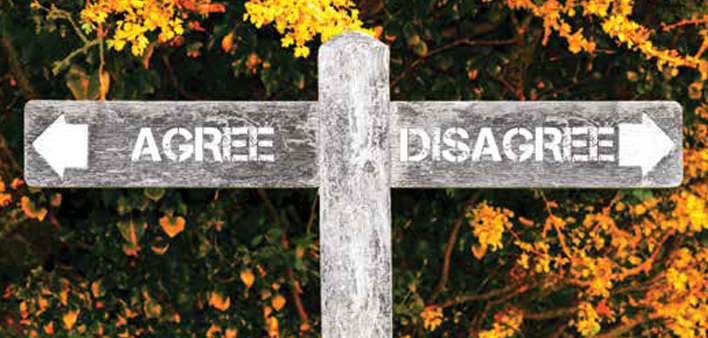Relationships—The Value of Agreeing to Disagree

By Shelley Bonanno
Conflict is an inevitable part of relationships, particularly in emotionally close ones. And while many people attempt to avoid or minimize conflict, conflict in relationships is not necessarily a situation to be avoided. In fact, research has shown that conflicts and disagreements can not only be healthy, they can result in better decisions in general and can strengthen and deepen relationships.
According to the Merriam Webster dictionary, agree to disagree is a phrase that refers to, “agreeing not to argue anymore about a difference opinion.” Disagreement does not have to lead to hostility. In fact, it can lead to discussion and better understanding of ourselves and others. Agree to disagree is the resolution of a conflict that requires all parties to tolerate the opposing positions, even when they do not accept it as the best choice. It is natural and normal to have honest and valid differences of opinions. In committed relationships, agreeing to disagree allows us to put these inevitable differences in perspective. No couple can agree on everything and irreconcilable differences do not mean you cannot continue to feel emotionally connected with another person. Feeling accepted by your partner, even if they disagree with your opinion, can increase intimacy and closeness.
Differences of opinion are normal in relationships and can foster deeper understanding and growth between individuals. While it can be difficult to keep an open mind, particularly when we feel passionate about a subject, listening to another person and empathizing with their situation, even while not always agreeing with their point of view, allows us to gain a deeper understanding of ourselves and others. The benefits to being open-minded can be numerous, including better problem solving skills, better coping skills and reduced stress.
Positive agreeing to disagree occurs when individuals recognize that further conflict would be unnecessary, ineffective or otherwise undesirable. While unresolved disagreements can lead to charged conflict between people, agreeing to disagree allows us to feel closer and can also lead to an increased understanding of one another because it requires us to hear the other point of view. When viewed from this perspective, agreeing to disagree can be view as affirmative. It provides the opportunity to foster our own growth and develop a diversity of perspectives. Having access to a greater variety of viewpoints inevitably results in more options and more flexibility for the current issue and for issues that come up in the future. It also allows us to let go of anger, especially about things that cannot be controlled or changed, instead of silently resenting the other person.
We can’t always change the opinions of others and shouldn’t feel obligated to do so. Being open-ended in the face of disagreement can teach us to be better listeners as well as more accepting of differences. It does not mean you’re giving in, but rather allows us to let go of some things, which is an important relationship skill.
 Shelley Galasso Bonanno, MA, a lifelong resident of Macomb County, has been a practicing limited licensed psychologist for nearly 30 years. Ms. Bonanno is also a court approved mediator who has extensive experience in working with families involved in divorce/child custody disputes. Her writings have appeared in various online and print publications. An advocate for mental health, you can follow Ms. Bonanno on Twitter @shelleybonanno.
Shelley Galasso Bonanno, MA, a lifelong resident of Macomb County, has been a practicing limited licensed psychologist for nearly 30 years. Ms. Bonanno is also a court approved mediator who has extensive experience in working with families involved in divorce/child custody disputes. Her writings have appeared in various online and print publications. An advocate for mental health, you can follow Ms. Bonanno on Twitter @shelleybonanno.

